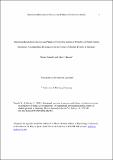Emotional reactions to success and failure of collective action as predictors of future action intentions : a longitudinal investigation in the context of student protests in Germany
Abstract
This research examined how emotional responses to success and failure of collective action relate to willingness to engage in collective action in the future. It was hypothesized that both pride (in relation to a success) and anger (in response to failure) would motivate future collective action. Findings are reported from a two-wave longitudinal study (N= 98) in the context of student protests against tuition fees in Germany, which was conducted before and after collective action had resulted in both a success and a failure. While anger positively predicted action intentions, over and above baseline action intentions, pride exerted a significant indirect effect on action intentions via increased efficacy perceptions, over and above baseline efficacy and action intentions. Politicized identification positively predicted the intensity of both pride and anger and baseline group efficacy positively predicted the intensity of anger. The theoretical and practical implications of these findings are discussed.
Citation
Tausch , N & Becker , J C 2013 , ' Emotional reactions to success and failure of collective action as predictors of future action intentions : a longitudinal investigation in the context of student protests in Germany ' , British Journal of Social Psychology , vol. 52 , no. 3 , pp. 525-542 . https://doi.org/10.1111/j.2044-8309.2012.02109.x
Publication
British Journal of Social Psychology
Status
Peer reviewed
ISSN
0144-6665Type
Journal article
Description
This research was conducted while Nicole Tausch was a British Academy Postdoctoral Fellow (PDF/2007/520) at Cardiff University. This manuscript was prepared while Julia Becker was visiting fellow at the University of St. Andrews and was supported by the German Research Foundation (DFG BE 4648/2–1).Collections
Items in the St Andrews Research Repository are protected by copyright, with all rights reserved, unless otherwise indicated.

